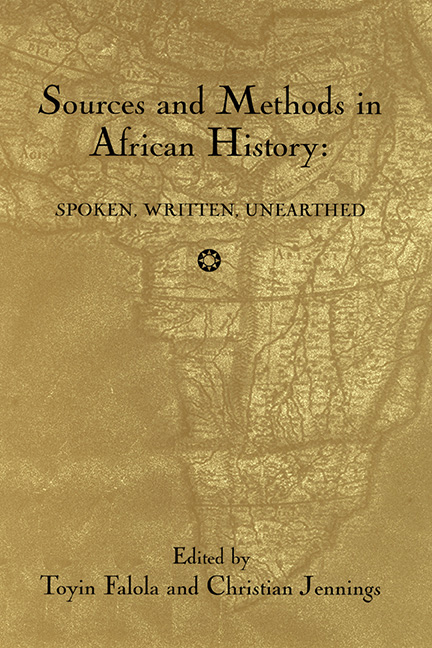Book contents
- Frontmatter
- Dedication
- Contents
- Acknowledgments
- Introduction
- Part I Archaeological Sources
- 1 Section Introduction: Archaeology and History
- 2 Trouble with Siblings: Archaeological and Historical Interpretation of the West African Past
- 3 Material Culture and Cadastral Data: Documenting the Cedarberg Frontier, South Africa, 1725–1740
- 4 Chronology, Material Culture, and Pathways to the Cultural History of Yoruba-Edo Region, 500 B.C.–A.D. 1800
- 5 For Trinkets Such As Beads: A Revalorization of Khoisan Labor in Colonial Southern Africa
- Part II Africa and the Atlantic World
- Part III Documentary Sources
- Part IV Oral Tradition
- Part V Innovative Sources and Methods
- Contributors
- Index
5 - For Trinkets Such As Beads: A Revalorization of Khoisan Labor in Colonial Southern Africa
from Part I - Archaeological Sources
Published online by Cambridge University Press: 25 October 2017
- Frontmatter
- Dedication
- Contents
- Acknowledgments
- Introduction
- Part I Archaeological Sources
- 1 Section Introduction: Archaeology and History
- 2 Trouble with Siblings: Archaeological and Historical Interpretation of the West African Past
- 3 Material Culture and Cadastral Data: Documenting the Cedarberg Frontier, South Africa, 1725–1740
- 4 Chronology, Material Culture, and Pathways to the Cultural History of Yoruba-Edo Region, 500 B.C.–A.D. 1800
- 5 For Trinkets Such As Beads: A Revalorization of Khoisan Labor in Colonial Southern Africa
- Part II Africa and the Atlantic World
- Part III Documentary Sources
- Part IV Oral Tradition
- Part V Innovative Sources and Methods
- Contributors
- Index
Summary
… denen sie für Kleinigkeiten, wie Glas- und Porzellanperlen, Tabak und so fort, Elfenbein, Wachs, Honig und gedörrtes Wildfleisch austauschen.
—Ladislaus Magyar (1860) in Petermann's Geographische Mitteilungen 6:228.Glass beads, cloth, tobacco, even guns and ammunition were cheap for nineteenth- century European traders in Africa, who often thought that Africans must place a similarly low value on these commodities and thus were ignorant and irrational to acquiesce in the adverse terms of trade offered for their cattle, ivory, and other products. Chapman (﹛1850s﹜ 1971 1:113–16) wrote that he obtained some items in trade for a “trifle of beads,” and that, in 1853, the natives “will do any mean thing to obtain beads” including prostitute their women (p. 77). Gordon-Cumming ([1850] 1904:254) and Andersson (1854:31), however, record that the initially high value of beads did not last long. At Lake Ngami already in 1853, Andersson noted that “beads were not sought after with the avidity they used to be, such quantities having been imported of late into the lake country, that (to use a vulgar, but very emphatic expression of Letcholatebe) ‘the women grunt under their burdens like pigs.’” In other words, Africans rationally assessed the worth of beads to them as they assessed other commodities according to their desire for a product, its availability, and its cost to them. Nevertheless, sentiments such as those expressed by Chapman and Ladislaus Magyar's dismissal as “Kleinigkeiten” (trinkets) of the merchandise he stocked carry a strong implicit devalorization of African labor—and, correlatively, African mentality— while raising the value of that labor's product to European heights.
But material objects, even commodities, are socially inflected and, therefore, are differentially marked as manifestations of relations of production and consumption in different societies. Thus, just as African ivory was inscribed with status as piano keys and billiard balls in bourgeois Europe, so was European glass in the form of beads inscribed by Africans as an element in the construction of objects of value.
Magyar, in the quoted passage, was referring to a particular group of Khoisan people, !Kung-speakers he called “Ka-ssekel oder, wie man sie im Süden nennt, Mu-kánkála” among whom he lived in central Angola in the 1840s–50s; today we call them Sekele and Kwankala (sometimes with Va or Ova prefix).
- Type
- Chapter
- Information
- Sources and Methods in African HistorySpoken Written Unearthed, pp. 80 - 102Publisher: Boydell & BrewerPrint publication year: 2003



